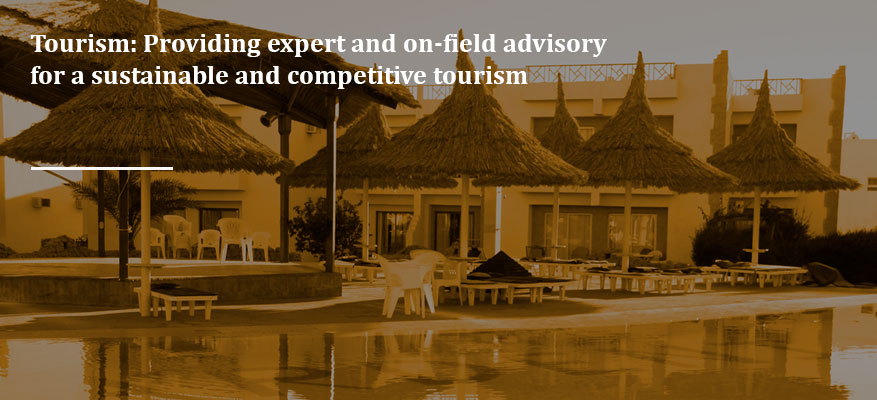Tourism

The rationale
- Tourism has a proven record of being a formidable source of opportunities for job creation and spurring local, regional, and economic development. Notwithstanding some remarkable examples in developing as well as developed countries, creating a sustainable, well-balanced, and competitive tourism industry requires careful planning and coordination among the many agents in the tourism value chain. The proper use of expert advice and best practices by tourism policy makers can help countries avoid common mistakes and achieve a more efficient use of public infrastructure and resources.
How to address the challenges
- Developing a long-term vision of tourism as a key driver of economic development.
- Working in close partnership with local, regional and national agents in the tourism value chain.
- Fostering service quality and innovation as key pillars of tourism competitiveness.
- Creating a continuous education framework that develops quality-oriented skills in tourism practitioners.
- Making tourism a transversal policy that leverages resources and requires work coordinated between different government departments and areas.
The Challenges
- Agents within the tourism value chain are diverse and pursue goals that are difficult to satisfy simultaneously.
- Low margins of tourism activities usually deter investments in product innovations, which could otherwise lead to differentiated, higher margin products.
- Mass tourism is sometimes seen as a threat to biodiversity and to indigenous communities due to cultural commodification and loss of authenticity.
- Low level of education and training lags the growth of tourism.
Our products
- Advice on the design of public policies aimed at fostering the clusterization of the tourism value chain, the development of public-private partnerships, and business innovation.
- Setting up and management of governmental program/project offices for planning, assessment, and follow-up of tourism policies.
- Design and implementation of innovative tourism products focused on the international markets.
- Field research, including scenario testing and local, regional and national action planning.
- Advice on setting up of public grants programs.
- Benchmarking tourism policies.

Francisco Javier NavarroDirector
Francisco Javier is a professional with an extensive experience and expertise in service-oriented business consulting and, more specifically, in the tourism industry. He has served for more than five years as the lead consultant for the Spanish Ministry of Industry and Tourism in the public-private tourism clusters initiative, which led to the creation of 35 tourism clusters in Spain. Along these years, he has been personally involved in advising and assessing each and every cluster project personally. Previously to this engagement, he was a Manager responsible for the Public-Private Partnership Practice in Arthur Andersen international consulting firm, where he served for more than 10 years.
He has also been for four years Advisory Board Member of Spanish Navarra region tourism cluster, as well as for the cluster of Accesible Tourism based in Madrid. He is also an expert in the development of tourism innovation projects, being responsible for more than two dozens of technology-based projects across the different agents of the tourism value chain, including lodging, catering, travel agents, income services, transportation companies and government. Along his career, he has also served as CEO for several service companies, including one regional airline startup.
SELECTED PUBLICATIONS & REPORTS
- Navarro-Meneses, F.J, Pablo-Martí, F., Carrillo-Hermosilla, J. (2015). Modelling Value Creation for Airlines Competitiveness: Summary Report. Available from http://ssrn.com/abstract=2688452
- Navarro-Meneses, F.J (2015). Why and How to Map the Complexity of the Firm. Available from http://ssrn.com/abstract=2585478
- Rubalcaba, L, Gallego, J., Vänskä, J. (2015). Exploring the pattern of customer involvement and interaction in service innovations in tourism. Universidad de Alcalá (mimeo)
- de Jorge, J. y C. Suárez (2014). Productivity, efficiency and its determinants factors in the Spanish hotel sector (1999-2007). Service Industries Journal, Vol. 34, nº 4, pags 354-372.
- Rubalcaba, L. Gallego, J. (2013). El turismo y los servicios intensivos en conocimiento en República Dominicana: desafíos y recomendaciones de política económica. BID.
- Navarro-Meneses, F.J (2011). Estudio Empírico del Perfil Innovador del Sector Turístico Español a través de los Miembros de la Plataforma Tecnológica del Turismo. Universidad de Alcalá.
- Navarro-Meneses, F.J (2011). Una Aproximación a la Innovación Abierta en las PYME a través de las Comunidades de Usuario en Turismo. Universidad de Alcalá.
- Navarro-Meneses, F.J (2010). Estudio Diagnóstico de la Situación Actual e Identificación de Oportunidades de la Innovación de Usuario en el Sector Turístico. Cluster de Turismo del País Vasco.
- Navarro-Meneses, F.J (2009). Plan Estratégico del Cluster De Turismo Accesible y Socialmente Responsable. Plataforma Representativa Estatal de Discapacitados Físicos (PREDIF).
- Muro, J., C. Suárez y M.M. Zamora (2009). Access and use of e-commerce in the Spanish tourism market, en Advances in Tourism Destination Marketing, págs. 170-182. Editores M. Kozak, J. Gnoth y L. Andreu, Routledge, Londres.
- Navarro-Meneses, F.J (2008). Plan Estratégico del Cluster De Turismo de la Comunidad Foral de Navarra. Sociedad de Desarrollo de Navarra (SODENA).
- Navarro-Meneses, F.J (2008). Plan Estratégico Del Cluster De Turismo Rural De Castilla-La Mancha. Junta de Comunidades de Castilla-La Mancha.
